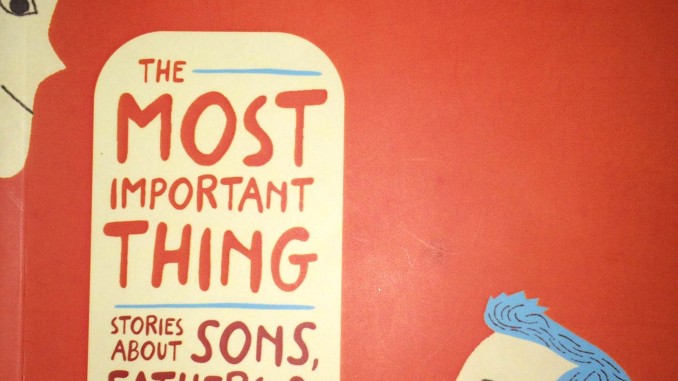
 As part of our ongoing collaboration with the Book House of Stuyvesant Plaza, our writers have accepted the challenge of reading and reviewing pre-publication review copies of highly anticipated young adult literature. The reviews are posted here for our readers, but also will be sent to the Book House where they will hopefully be used to inform customers about the books they may want to purchase.We will try to publish one review a week for the spring.
As part of our ongoing collaboration with the Book House of Stuyvesant Plaza, our writers have accepted the challenge of reading and reviewing pre-publication review copies of highly anticipated young adult literature. The reviews are posted here for our readers, but also will be sent to the Book House where they will hopefully be used to inform customers about the books they may want to purchase.We will try to publish one review a week for the spring.
The reviews contain spoilers, so be forewarned!
The Most Important Thing
By Avi
Published April 2016
216 pages, Candlewick Press
The Most Important Thing by Avi is composed of a few short stories about the importance of a father-like figure to a son. Each story has a interesting plot and is full of background information on the characters. The underlying theme of this book is the significance of a strong, but caring and loving father presence during a boy’s childhood. The point comes across differently in each of the seven short stories and also teaches a few life lessons. “Dream Catcher,” “Departed,” and “Kitchen Table” really stood out because of the tone the reader encounters, the story line, and how the protagonist of each narrative deals with overcoming their personal adversities.
The narratives each had completely different characters, plots and settings. The first story “Dream Catcher” is about a pre-teenaged boy traveling to spend a week with his grandfather that he has never met. “Every few years your father and I pull the thin strings that still seem to connect us. Never completely cut. We hold on, but don’t ask me what we’re holding” (33). The grandfather blames being a bad father to the boy’s father because he had PTSD from war. However, the boy and his father also have a poor relationship, “Then you’re a casualty of war, too,” is how his grandfather describes the situation (33).
The next story is “Kitchen Table” and is about a boy who dreams of winning a bike race that goes through his town. He is downright obsessed with winning because he has high hopes that his father, who left him and his mother long ago, will see him in the paper. Through a series of events, he is unable to compete due to his bike being stolen, rather ironically, the thief won the race and sped off when the boy came after him. “The bike was the winner. Not me. He’ll never find me, because you’re not a winner unless you’re picture is in the paper.” (68) “Beat Up” is about a boy who, while coming home from a dance at his church, is beat up by a gang of kids his age. When he comes home with a black eye, his father is very disappointed and goes to great lengths to improve the communities safety, while covering up that only the smallest boy in the gang punched his son. The boy seeks acceptance and is fed up with his dad avoiding the real issue of cowardness.
Another story, “Departed,” is extremely dismal in that the main character’s dad dies on the same day they are supposed to go on a father-son camping trip. His grief stricken mother asks him to do something, anything with his dad’s ashes. “The first was what Dad had told me that last time we had gone to the lake: I can’t think of any other place I would rather be.” The son goes to the lake to put the ashes where they belong. “The Amalfi Duo” is about a boy who hangs out with his grandfather everyday after school, but starts to become embarrassed of him when he makes a new friend. He no longer wants to hold hands or play trivia games with his grandfather anymore. They take recorder lessons together and the grandfather practices so much, but is nowhere near as good as the boy is.
“Going Home” has a sad plot about a boy with divorced parents, but his mom has more custody; he only sees his dad one weekend a month. His mom drops him off at his dad’s house, the boy finds out that his dad has married a young woman and neither of them knew about the other. “I wish he had told you. Wish he had told me about you, too” (155). The boy feels hurt and betrayed and decides to go home.
The last story, “Tighty-Whities or Boxers” is about a boy who is going to have a stepdad. He interviews him over the phone and with a questionnaire that is quite funny and maybe a little personal. The mother’s finance in question is really easy going and ends up being a good match for their family.
Avi writes not only with meaning and purpose, but with ease. The book is easily understood because of the details provided. Since it was written in the present tense, readers are often on the edge of their seats ready for what will happen next. The purpose of this book, was to show that although parenting is difficult, a father-son relationship is crucial. Avi depicts the ups and downs of fatherhood through the eyes of the son, and shows how different childhood can be for each individual person. The reader reacts differently to each short story. Some are rather endearing, whereas others are somewhat distressing. Some of the stories are a bit hard to relate to due if one has not experienced anything of the sort. However, when the gang corners the boy, and makes him fight one of them, it is hard to relate to this sort of occurrence. On the other hand many of the narratives will connect to young boys going through the same thing in real life. Many life lessons can also be acquired through the reading of this book, such as the importance of family, not to be ashamed of who you are, being there for someone, and keeping connections.
In Avi’s book, The Most Important Thing; Stories About Sons, Fathers and Grandfathers, each short story shines a different light on what a father should do for their son. The stories depict boy’s seeking guidance, acceptance and a role model from their fathers. The book reveals that how the father was raised by his father often affects his own parenting. The book is relatable to many boys around the age of 12 who could have a variation of father figures in their lives. The seven boys’ stories Avi introduces all have compelling stories that many boys can relate to.
